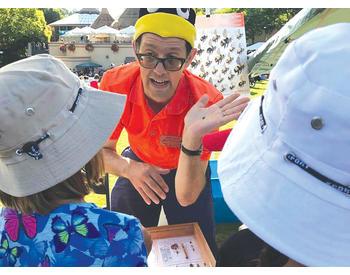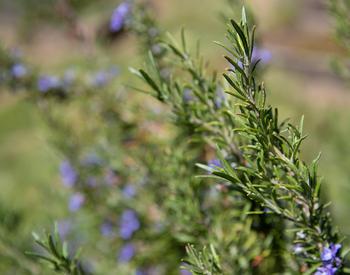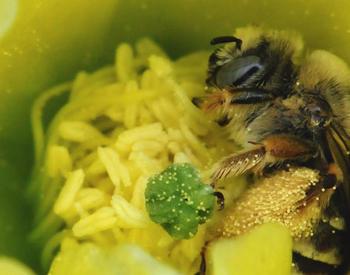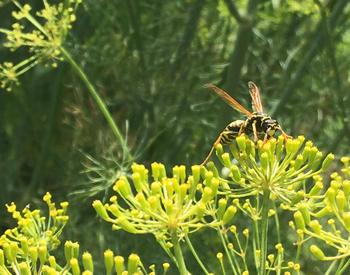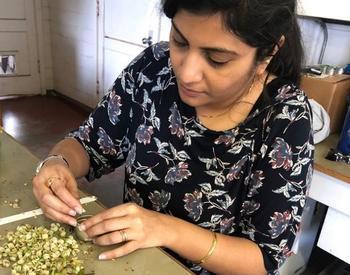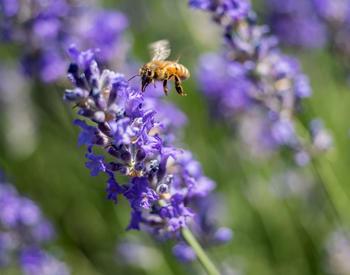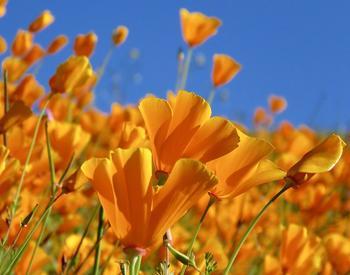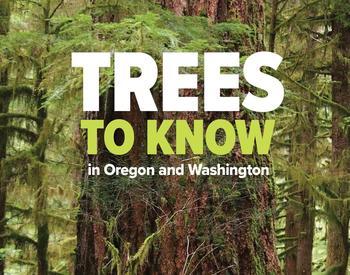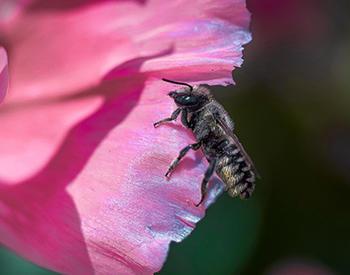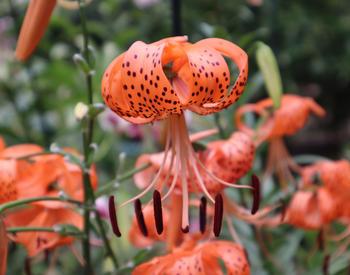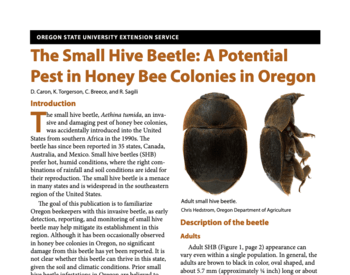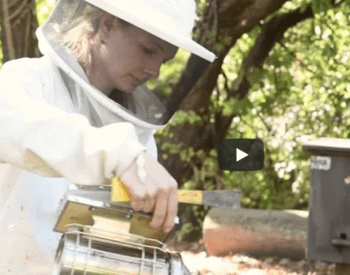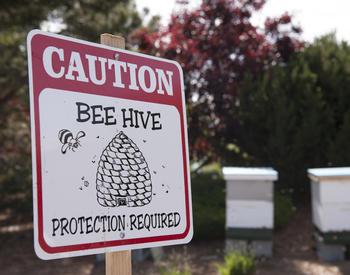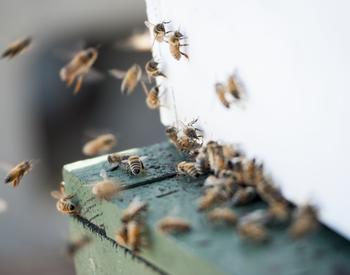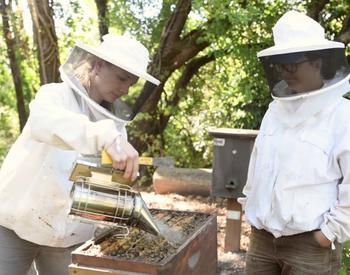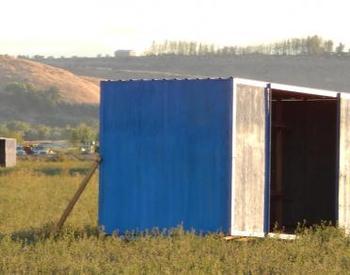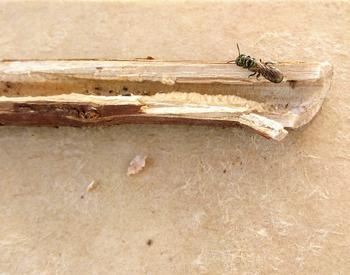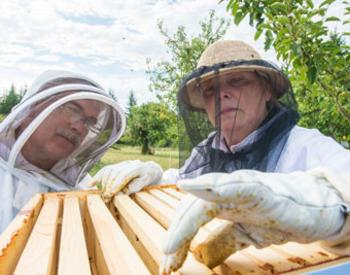Transcript
[00:00:00] Andony Melathopoulos: Never did I ever think that. There would be a podcast that I would be hosting that would reach 200 episodes. And in fact, that's where we're at the 200th episode. I look back to 2017 may our first episode with Francis, Rodney X and thought maybe the show could go on for a year. We'll see how it goes.
[00:00:18] But over the last couple years and 200 episodes. Met some wonderful guests. I've learned a lot and I've also had the great opportunity to meet all of you. Not all of you, but I've gotten emails from you. I've met you at conferences and counting you on social media. It's been really wonderful. This has been a great experience for me.
[00:00:39] I thought how to mark this anniversary. My idea is I'm going to take you up the stairs to the fourth floor of the ag life science building, where my program is housed the pollinator health program and introduce you to three. Actually four people who have really transformed my life over the last few years, the pollinator health program started five years ago and over time there've been new people added to the program, started with Jen Larson.
[00:01:07] Sarah. Lincoln best. And most recently in our office, we've had the opportunity to host Dr. Michael Berget, who is an emeritus faculty, w all four of them, all four of these people we've had on previous shows. They're the hot house that gave me all the great ideas. And they've made the last five years of my life, the best working years I've ever had.
[00:01:29] So this episode, we're going to go in, we're going to talk about the pollinator health program. Where it started our memories of it and where we think it's going. And along those lines that just want to remind you from last week, we have a, from now to January 15th, we're fundraising for the Oregon bee Atlas.
[00:01:46] You can make a contribution to it's a 5 0 1 C3. So it's tax deductible to help us identify some strange and crazy bees here in Oregon. So I'll put the link on how you could use. Below, but without further ado, let's go up the stairs to the fourth floor to meet the pollinator health lab this week on pollination.
[00:02:10] Okay. So I thought this would be a great occasion for podcasts. It's 200. We're coming up on this program, being it past five years old, right? Yeah. Five years old. So we've reached the milestone and, I thought it'd be a good chance for everybody to get to know the behind the scenes what's underneath the hood of the program.
[00:02:30] And also just what we're having in mind for the future. What I want to ask you all is what were you doing before you joined this team? I know for me, I was in Lethbridge. I was in Lethbridge, Alberta. We've had Shelley Hoover on previous episodes and I was a postdoc working on canola, pollination down in Southern Alberta.
[00:02:45] But where were the rest of you? Before you came here.
[00:02:49] Jen Larson: I had taken about an eight year break from working in general to raise my kids. And then I'm back in a previous life. I was a landscape architect, I'm from Florida. And so my first love was plants.
[00:03:02] Andony Melathopoulos: But your first plant was planted. My first love of plants.
[00:03:06] It's still and it's still
[00:03:08] Jen Larson: is yes, I'm a plant and person for sure. And so I worked in landscape architecture for several years and it seems unrelated, but actually the skills that I learned in project management in the field of architecture have translated directly to my job. Now,
[00:03:24] Andony Melathopoulos: I also ran a beekeeping
[00:03:26] Jen Larson: supply company.
[00:03:27] I did. So I got into bees. So something about me is that I don't dip my toes into new hobbies. I jump in passionately and start keeping honeybees. I started a company here in town with a couple of friends selling beekeeping supplies. We sold our company eventually to shinguards nursery. And then I took this job here.
[00:03:44] Lincoln Best: Well,
[00:03:44] Andony Melathopoulos: Sarah, what about you? You have the longest routes in pollinators, in our little group in Oregon and in many ways, where, what were you doing and what were you doing before you joined the team? Because. What you were doing before you joined the team, shaped the team?
[00:03:59] Sarah Kincaid: Yeah, I did.
[00:04:00] So I am a graduate of Oregon state university. Actually. I got my master's here. Maybe. I can't remember the year, but maybe 10 years ago now or so. And I got a master's and I was working with bumblebees in the Pacific Northwest for that research. And after that I did a stint with the Oregon department of agriculture where I was hired on there after school to finish up a native bee survey in crop lands throughout the state.
[00:04:28] Andony Melathopoulos: Postcards, these bees, the Oregon postcard, that was part of that study. You went through and found these bees on. Yeah,
[00:04:34] Sarah Kincaid: but all those images came out of funding from that study itself. But when that study was over, I was hired on essentially to become the manager. Not the manager, but the head of the Eugene field office, the ODA has various or did until recently had various offices.
[00:04:51] The state, which is really part of their network of insect trapping teams that they have. Then the main purpose of the group that I was part of, which was the insect pest prevention and management program was really to monitor the state for invasive species. So my primary roles before I left the OTA was actually leading a team.
[00:05:11] Insect trappers, who were sent out throughout the state to monitor for different pest species. But as an addition to that, I also continued B work on the side which is where I met you. We I helped found the Oregon bee project and then had long dreamed of starting an Oregon BS.
[00:05:32] I am an ideas person. I've had many ideas and My time and I always thought it would be great to start a volunteer volunteers, led survey and made her bees. And I was so excited when I met you because I got you to adopt all my crazy ideas that no one would consider previously. Yeah,
[00:05:49] Andony Melathopoulos: there were all good ideas.
[00:05:50] And the other thing I was going to say about. In some ways you re you're the connection to the past because at Oregon state university, there were people, Andy mill danky for example. So Jaya, Rao, but also bill Stevens. And you over, you were the, you're the only one of us who overlapped with that generation.
[00:06:08] Kind of in your previous work?
[00:06:09] Sarah Kincaid: Yes. Yeah, it was my pleasure when I was here during graduate school, actually to get to work with some of these researchers, especially those Steven who has since passed away. And I learned an incredible amount from those individuals. So it was really lucky to still be here when the old guard was still in operation.
[00:06:27] Andony Melathopoulos: Bill Stevens, a good example of Canadian. From Saskatchewan, I guess that link that's where you come in as another fellow Canadian, we needed to increase what we call in Canada. The can con content
[00:06:41] Lincoln Best: dated
[00:06:42] Andony Melathopoulos: what you were doing. And in some ways we, yeah, I think I met you in a number of places at university of Calgary when I was working with Ralph Carter, but also just, anywhere you turned in Western Canada, you were there.
[00:06:54] I think Sarah took a course with you. So what you were doing a lot of things before you got here.
[00:07:00] Lincoln Best: Yeah. What was I doing before I joined the pollinator health team? Officially I joined the team just last year in March in 2020. But I had been coming down here for a few years contracting to do identification and teaching and the usual kinds of things.
[00:07:16] But before I was here, I was spending my falls at the university of Calgary with Paul Galpern EqualLogics lab, which was a really awesome experience. And I was spreading spending the remainder of my year. I'm usually working on my own grants and then running courses as well as providing taxonomic services as I do.
[00:07:37] So those things were keeping me really busy throughout Western Canada. And I feel very fortunate that I've been able to work with so many people. And in so many places,
[00:07:47] Andony Melathopoulos: anybody who gets to know, It goes way farther back. We have, we've all heard over beers, crazy stories of flying airplanes through gorges in central Asia.
[00:07:56] And you've been doing native bee work far beyond the time that you were working. I think you described it, like you've been doing it since you were really young, like your yearbook photo has. Yeah. My,
[00:08:07] Lincoln Best: yeah. So my sixth grade year book photo says that I think that said that I wanted it to be a zoologist and something else along those lines.
[00:08:15] And so that's forked out, I think, ultimately but for sure, Y I've always since early childhood, I've always had a deep fascination just with natural history. And so whether it's, shiny rocks plants or animals, it's just I'm just curious about all of those things.
[00:08:30] And so as a child my parents did encourage me to make an insight collection, which in the mid eighties included bumblebees. And so there are specimens that have collected, over 30 years ago. And it I would say pick that back up during my undergrad years and then just continued to escalate
[00:08:49] Andony Melathopoulos: and here we are.
[00:08:52] All right. So I've written some questions on the board. If you walk into our office, we've got this brand new office. It's got Mike Berget a former guest on the end. And then Sarah, is there links there. Jen has her own out Cove with all the extension. Publications is beautiful, just down the hallway from here, but we have all these boards in here just trying to keep track of all the projects we're doing.
[00:09:13] And I've written on the board, some questions for our podcast. And I guess I'm going to skip over to questions and just go to number four. Of what's your proudest achievement or what do you consider the, I guess I'm going to change this a little bit. What do you think the pollinator health program has accomplished, in the last five years, what has been in, in your mind when you look back at all that.
[00:09:32] And all that you've done personally in the program, what are the moments that come to mind? And I have to say for me, it's bringing all you together. Having you as a team here has been just, I never, in my wildest dream when I was Sarah visited me early on, it was an empty office. And the thing is like, what are you going to do?
[00:09:49] I never imagined I'd be sitting around this table with you guys. But what, w what do you guys see as the program strengths and, what have you even been proud to accomplish personally within the program?
[00:10:02] Jen Larson: Okay, I'll start. This is Jen. I would say the proudest thing for me to watch and participate in has been the creation of the master Mela tologist program, because when I started with you at the beginning My job with you is undefined, which if anyone knows the Doni means that could mean anything.
[00:10:19] The job description includes anything and everything. So it's no small task to create an educational program from scratch. I also worked for the master beekeeper program, but I jumped into an existing program with that job. So to be part of. The formation of the educational program from the ground up has been I think my proudest achievement and what I've enjoyed watching the
[00:10:39] Lincoln Best: most,
[00:10:39] Andony Melathopoulos: And we've, I think we've drawn a lot.
[00:10:41] Your experience with master beekeepers has, we've, in some ways paralleled the program, like the idea of like multiple levels in the master methodologist program is modeled off of master beekeepers. That experienced seam has been really key to us, trying to think about how to conceptualize this program.
[00:10:58] Also, I imagine the other thing is that, with people, I think we've had you on an episode years ago about master beekeepers.
[00:11:07] Jen Larson: It is it's really grown. We span Oregon into Idaho and Washington state and even some people further field. So yeah, we're five to 10 years ahead of where the muster military program is.
[00:11:17] So I can. Better forecasts and pitfalls and things to avoid, and also some things to really highlight and strive for. So
[00:11:26] Andony Melathopoulos: what about you? What's been your, yeah, I say
[00:11:28] Sarah Kincaid: my proudest achievements also center around the mastermind fetologist program and it's actually not so much my achievements, but really getting to celebrate the achievements of all the volunteers.
[00:11:39] I'm I love teaching. I'm not classically trained as a teacher, but migrated joy is. People who really didn't have a background in science. Just take off in this field of study and just the amazing discoveries that they've made and their personal journeys as well. I find inspirational all the time and I love that they have far surpassed me in my native bee knowledge is that's.
[00:12:03] What's great for me to see. The other thing that I think is just amazing is how robust our data set to ensure. Is, in a short number of years to have one of the Roma rope, one of the largest data sets of native bees and their host plants in the world is just fantastic. And I think more than I ever could have hoped for the project itself.
[00:12:26] Andony Melathopoulos: Yeah. I remember early on we, you and I, you were still with ODA. We drove to climate falls, I think in grants pass. And remember we saw, especially in grants pass where we, We recently lost a Phyllis Macintosh, there's, we saw that there were people in the state who really, and I remember it for you, but it's just that the light cause you really, you hate.
[00:12:48] Any kind of extension that involved cartoons or pictures you wanted people to handle real.
[00:12:56] Sarah Kincaid: Try to insert them in. It drives me crazy. I don't like cutesy stuff,
[00:13:02] Andony Melathopoulos: but there was people before that there were people who really wanted to dig deep. And you were real. I remember how excited you were, how pumped you are when you left those sessions.
[00:13:10] Yeah,
[00:13:10] Sarah Kincaid: I get excited about the details of life and biology. That's where my passion lies. And to be able to geek out about those things with others has been black.
[00:13:20] Andony Melathopoulos: Yeah. I got a link. How about yourself? You've been here you've been around the program for a long time.
[00:13:27] Now you're officially in the program and I imagine we've heard you talked to volunteers about the master methodologist program and but what's what do you, what would you, how would you make.
[00:13:36] Lincoln Best: Yeah, my proudest achievement or our proudest achievements within the pollinator health lab. Obviously my bias is towards all of the native bee biodiversity work that we're doing, which is.
[00:13:50] There's a lot. And I think the most valuable thing that we've developed is all of this infrastructure for the programming and the outreach and knowing how to engage people, train them to quickly to a professional level and enable our capacity to do this kind of research. Has is it's just, not too long ago, it was just unthinkable that something like this would be possible.
[00:14:15] And so the fact that we have a master mellow tologist program with hundreds of people, either in it or signed up to join and the fact that we have people going, with be trap lines all over the state studying, more than a thousand flowering plant species and so on. Yeah beyond my dreams.
[00:14:35] So the infrastructure though, I think is the, the foundation of it all is really the valuable part because it can be replicated in other places, in other states and other provinces and other countries. All it's potentially it could be functional all over the world where there is a volunteer capacity.
[00:14:53] So it's a pretty amazing, we
[00:14:54] Andony Melathopoulos: really have geared up. I, know, I think about Jen's office, for example, she's got a big rack there with pub, extension publications, ready to go out in an envelope. Like we really have the ability now that we didn't have five years ago to quickly get information out to people and people who are trained and know how to talk to the public.
[00:15:12] I think our. Volunteers are amongst the best outreach and extension people in the nation, to be honest and they, in many ways will surpass me. And in terms of their knowledge of native bees I feel that's a real Testament. Yeah. They're not all
[00:15:27] Lincoln Best: just. Lots of them are high quality professionals.
[00:15:30] I always joke that, they're smarter than I am by fair degree. And, in some cases that's definitely a fair assessment.
[00:15:36] Andony Melathopoulos: So yeah. Thinking about the one thing that. I spoke to them about like my proud achievements for the program have been reaching out. Now we do a lot of native bee work, but we have strong connections to beekeepers in the state we serve, we've got an excellent AICPA culture program at OSU, but we do supplement and provide research and information to beekeepers.
[00:15:57] But also to the land managers. I think we've trained more pesticide applicators on how to read a pesticide label for pollinator health, anywhere in the nation. And, the connections, I always, I'm always proud that whenever we talk about bees, we can get conservation organizations or organizations around the table.
[00:16:16] And they're just, this seems to be productive. Like we don't have the kind of. Situation where people are there's conflict. I think everybody's focused on how do we do this in Oregon? Which I always, yeah I am proud of. That's an amazing thing. All right. So talked about what we've done.
[00:16:32] So what are you looking forward to the next three years? So you've built this infrastructure. We've, we're all jazzed and excited and we've got volunteers. Phyllis with enthusiasm every day we come to work. What do you see the program looking like in three years, this doesn't look like the same, but bigger, or is it the same or you're hoping that something gets off the ground.
[00:16:51] Jen, I would imagine one thing that we've talked about for the master methodologists program specifically is having low levels.
[00:16:57] Jen Larson: Yeah. That's exactly what I was going to say. I'm excited to add to. The educational content of the master Mela Telegist program. So we have a bunch of enthusiastic apprentices that are ready for more and so journey and master levels that will mirror what we have in the master beekeeper program.
[00:17:14] But I think what I'm actually looking forward to the most is seeing. The students become more active in leadership positions in the program as I keep referencing the master beekeeper program. But what's neat about that is that students that started maybe five years ago in the program are now stepping up as mentors and instructors.
[00:17:32] And so at some point you reach this level where the students take the wheel more and more in the program. And so I'm excited to see that happen. It's happening already, but. Excited to save growth.
[00:17:45] Andony Melathopoulos: I would say for myself, I, Sarah has been working a lot with these NRCS grants that we've been doing with land managers.
[00:17:51] We've been working with collaborators like Marcella Moretti or weed scientist and circa and a Tez or pasture scientists and Sandy DeBono and Chris Adams. And it strikes me that the native bee work is really opened up a lot of opportunities for. And I think this came up, link calls this as manifesto, but in terms of creating plant communities that are really good for pollinators and specific and targeted.
[00:18:18] And I think we've been able to create such a good bridge to land managers across Oregon. And we just need to in the next few years, I'd like to see those dots connected a little bit more where we seed growers are growing seed mixes for specific as cost effective and the kind of pushback we've heard from some growers in terms of expense, we get around and we start to like really roll out a kind of integrated approach to habitat.
[00:18:42] I think that's been one of the things that we've done really good work around pesticides and pesticide mitigation, but the habitat piece is the tricky one. And I guess the other thing that I've been excited about is working with soil and water conservation districts or. And con land trusts. And I think there, that was that was something that we lacked in the first few years.
[00:19:00] We didn't have a connection to those groups and now those connections are starting to be made. And I see us all of those things coming together in some way. That's my hope for the next few years.
[00:19:11] Sarah Kincaid: Yeah I would vote on that too. It just having better extension resources for all those different groups and industry groups and growers.
[00:19:19] That's something I'm really excited about, in the past, a lot of the pollinator recommendations were just general recommendations that were not. State-specific or each Bigo region specific or industry specific. And so through more and more projects, we are I think building our arsenal of more targeted extension materials that will actually lead to real change on the ground for pollinators species in Oregon.
[00:19:44] And I think that's really exciting. And then for me also, again, back to just really. Loving the teaching aspect of extension and information for the general public is seeing some of our materials trickled down to school, aged children in the K through 12 age range through some of the new initiatives that we've been working on.
[00:20:05] And that's really exciting to me. So the next generation let's just get
[00:20:08] Andony Melathopoulos: clear we've you've been working on. So the coloring book, the Explorer Oregon B's coloring book was something. Pushing for a long time, you collaborated with food hero and suddenly there's this new avenue for us to reach children that we had a youth that we have not been able to do.
[00:20:26] Yes.
[00:20:27] Sarah Kincaid: And what I think is so exciting about that work is that highlight some of those same relationships that you were talking about earlier. That the pollinator health lab here has a real. Unique relationships, both with the agricultural sector, as well as soil and water conservation districts and ecological groups.
[00:20:45] And all of that information is in these resources for children at a level that they can understand, so it teaches children about the role of seed growers in, The role that bees have in growing seed crops and how that translates to our nutrition and just basic concepts about pollination and insect life history, all of that is really exciting to me.
[00:21:08] Cause I, I'm a mom with small children and I feel like a lot of this information is no longer taught to children at the level that I'd love to see it be introduced to them. And I feel like. Just so love of science sets children off of such a great lifelong journey. And I, so I'm really excited about those resources.
[00:21:26] And again, they're at a level that I think we can all feel proud of. I, one of the things I love about this group is that we. Don't underestimate the general public to understand and be interested in scientific material. And so we have a pretty high standard for our materials and
[00:21:44] Andony Melathopoulos: the Canadian parliament, when something like that is surgical your hair, or, but I would, the other thing I would say is this sort of, I think this ethos comes from something that you inherited before we got.
[00:21:57] So Jaya Rao had, and bill had this idea that diversified cropping systems in Western Oregon are leading to be Deborah Bebo diversity. And I think that connects to the education, getting that message out to the public and getting that message out to people so that they understand the importance of diversified agricultural systems and especially.
[00:22:15] Sarah Kincaid: Yes. Yeah. And I think it's part of the Oregon climate here as a whole, we were especially graft state. We've said this many times, we have great crop diversity and crops that support a lot of our generalist pollinators. And they have a long history together doing that.
[00:22:31] It'll end up a decent history of extension research into those topics as well. And we're certainly carrying on that tradition.
[00:22:41] Andony Melathopoulos: All right, Willink. I know you have several manifestos. What's your manifesto for the pollinator health program for the next three years.
[00:22:46] Lincoln Best: Honestly, I think the last few years we've been developing all this programming I think, and it's been painful to do well.
[00:22:54] It's been difficult. Yeah, absolutely. It's been a, it's been a lot of work and so we've developed all this programming and I would just like to see us continue to reflect. The various components to make them more efficient and then enable us to work at a higher capacity to see, 200 and 500 people enrolled in our master methodologists program would be fantastic.
[00:23:18] They don't all have to be Atlas contributors, but to just to have that amount of people or that number of people being. Educated and trained. And, a lot of them are just using the training to start their own projects and other places. And so that's really quite satisfying with respect to the native bee plant restoration conservation narrative that, the datasets we're generating are really.
[00:23:47] Rich with respect to pollinator and plant species. And so as we roll the data out, I'm really looking forward to working with lots of different stakeholders to put that information, to work in the field which is something I dreamt about for a long time. And of course, like a lot of these bee species and plant species.
[00:24:08] In Oregon, they're all over the Western us and Western Canada. So that's going to be really exciting to just be able to integrate the knowledge that we've created into more decision-makers. Conservation action. And then selfishly I just want to continue to add species to the Oregon, the fauna list of what we know exists here and what they're doing and where they are.
[00:24:33] And it's every day I feel like I turn around and there's new bees to add to the Oregon state bee list. And so I find that to be particularly satisfying. So in three years, wow. Lots of more bees in our reference collection, lots more bees that have been barcoded so that we can, hopefully elucidate what some of their identities are.
[00:24:52] And
[00:24:52] Andony Melathopoulos: It's I'm glad that you raised that up. Cause I, the other thing I'll mention during when this episode drops, we're right in the midst of her fundraising. And so for the Oregon bee Atlas. And if you, it, I really encourage you. We had, I remember we had like gene next. I was on a call educational seminar we were doing.
[00:25:10] And you mentioned the importance of barcoding bees and Jean paid for the barcoding of a whole bunch of bees. It was about $5,000 or so, or, yeah. And
[00:25:19] Lincoln Best: so we've submitted a few hundred Lazu gloss, some specimens representing maybe upwards of 75 species. There aren't really very good keys or resources available for Western us or Oregon species.
[00:25:34] And barcoding, upwards of 75 different species is going to provide us with reference material. That'll help put names on some of those, and it'll just ultimately provide a lot of reference material so that we can use to compare new material coming in against those molecular or genetic groups.
[00:25:49] And th
[00:25:50] Andony Melathopoulos: I was thinking also about Jerry and Judith, Paul who've actually set up pollinator fund at the foundation, the sort of there's all sorts of ways to support this work. And it really does require support. I think we look to Oregon flora as an example of a program that's been sustained over 30 years by volunteer contributions and has really provided a lot of information back to Oregonian.
[00:26:10] So if you are injured we'll put the link in the show notes. So we really would, a contribution would be really helpful to keeping everything moving around here. As you see, we've got a lot of ideas. All right, let's take a quick break and then we'll come back. We do this segment as you probably all know, you all listen to this podcast.
[00:26:27] All right. And let's, we'll be right back. All right. Book, tool tools.
[00:26:33] Lincoln Best: Species. Yeah. All right. But
[00:26:35] Andony Melathopoulos: all right. For me, the book is simple. Book is simple. I worked, my master's work was with Dr. Mark Winston. I still think the biology of honeybees has not been replicated. Nobody's come up with anything like that.
[00:26:52] Since it is really well-written the illustrations in a honeybee biology are they're all hand rendered. They're really great. And so for me, the best book still, that might the book that I recommend to anybody getting into interested in bees. If you want to be able to sit down, read something, cover to cover and have a kind of snapshot about a species and natural history.
[00:27:16] There's not really a better book. So that's my booklet foundation.
[00:27:21] Okay. What's yours, Jen. You've now looked it up. Oh, but you're typing it.
[00:27:26] Jen Larson: I'm verifying the title. I love that one. The sacred B. So you could be in ancient times and folklore. What the heck? This one,
[00:27:34] Andony Melathopoulos: I don't
[00:27:34] Jen Larson: know. It. It's just full of references to be keeping and that's, what's great about it.
[00:27:39] Sarah Kincaid: Yeah.
[00:27:40] I love that. It's really
[00:27:42] Andony Melathopoulos: cool. Oh, it's got a picture of a scap out there with bees and some kind of courtyard. Yeah.
[00:27:50] Jen Larson: The sacred be in ancient times and folklore. So yeah, I've talked about this in previous podcasts where. The thing that I love about beekeeping the most is just the sensory connections to previous generations and even ancient civilizations.
[00:28:04] So the same smell that you're smelling is, the same experience that people have had through the years. And so I love books like this, that tap into the cultural references.
[00:28:13] Andony Melathopoulos: That's very cool.
[00:28:17] Sarah Kincaid: Oh, I have the standbys and ones I brought up before. I love bill Stevens, the biology and external. What is it? The biology, external morphology of these, which I still think is an excellent resource. And I wouldn't love someday to do an updated version. I think would be a fantastic thing actually for this very group to put together.
[00:28:41] Lincoln Best: Yes.
[00:28:42] Sarah Kincaid: Yeah. It's way out of date, especially the taxonomy. It needs to be updated. But still a wonderful resource. The solitary bees, I also think is just really a fantastic book again, that it's very user-friendly while going into. The topic of native bees across all aspects in great depth and just brings together a lot of wonderful bee research into one
[00:29:07] Andony Melathopoulos: resource required reading for any master melancholy.
[00:29:11] Sarah Kincaid: Excellent. Excellent.
[00:29:12] Andony Melathopoulos: Yeah. I'm just
[00:29:16] Lincoln Best: going to stick with the BS of the world and engineer's Opus. I read it every day at breakfast. I read it. I read a
[00:29:21] Andony Melathopoulos: section. That's awesome. I love it. I use it as a pillow. So
[00:29:27] Lincoln Best: you, yeah, you use it in the morning. I use it in the evening. It's a, yeah. It's, it's just dance with information and I love
[00:29:35] Andony Melathopoulos: it.
[00:29:35] There is this Lisa Robinson has pointed out that Dawn Rolf's. I kind of spiral bound, broken up version of it that various people have gotten their hands on. Oh yeah. Yeah. Lisa, if you're listening, wants one. Okay. Next a go-to tool. I've everybody knows on the show. I have this melting stool that I use for working bees.
[00:30:01] And I Lenay obeying the technician in the university of Lethbridge B lab. Formerly sewed me a cushion when I left Lethbridge. And so it's got a custom cushion on it. I love that thing.
[00:30:12] Jen Larson: For me, McCord frame grips the McCord frame grip. It's this metal tool that lets you lift frames out of a hive.
[00:30:20] Unfortunately they're not made anymore. There are different knockoffs available, but the original McCord frame grip, if you have one hang on to it.
[00:30:26] Andony Melathopoulos: Dr. Mike Berget has come into the room. We're recording a podcast. Mike, what is your go-to tool for working with bees? I want it to hive tool. What kind of high tool
[00:30:39] a J grip does? They'll do things that rip up. Excuse me. Or whatever those are really all right.
[00:30:48] Mike Burgett: It was interesting. Sir, Edmund Hillary was a beekeeper
[00:30:51] Andony Melathopoulos: really, and we knew
[00:30:53] Mike Burgett: this after he ascended Everest, the New Zealand beekeepers association gave him a chrome-plated hive to all engraved and somehow it ended up in the car.
[00:31:06] Lincoln Best: Collection really.
[00:31:08] Mike Burgett: So one day I'd lost all my high tools. So I went into the display case and grabbed it
[00:31:20] Andony Melathopoulos: and it was the first time I.
[00:31:23] Mike Burgett: Jay type hot tool. Wow. This is much better. Did you put it back? Oh, yes.
[00:31:33] Andony Melathopoulos: Oh when we learned secrets here on a pollination. Okay, Sarah, what's your go-to tool?
[00:31:40] Sarah Kincaid: Not that surprising. I always go with a good pair of forceps. They just come in handy for everything. I hate software. Or soft touch tweezers, I think are worthless. You need something can really grip things with, and then a dissecting microscope is pretty, it's just a fantastic tool regard, no matter what you're doing.
[00:31:59] I think that the microscope is great,
[00:32:01] Andony Melathopoulos: fantastic link. Whether you're go-to tools. I have quite
[00:32:04] Lincoln Best: a few tools that are indispensable. There's one that I have with me all the time. And it's a leather man wing man, which is a Leatherman Wayne man to all, which is, one of those little pocket tools with flyers and everything built into it.
[00:32:19] And so
[00:32:21] Andony Melathopoulos: I use it all the time. Incidentally, talking about tools, I still have your booster. Oh, you do. Yeah. I got to get it back to ya. Okay. Last they repeat mine. Mine is the honeybee. It's been the bee species that opened the doors for me. The thing I always love about honey bees is the people around honey bees.
[00:32:40] And that's. I think that I bring that to the program every day. I love that you can go into any city in the world and find a bunch of people who work honeybees and you can strike a conversation with up with them. And I love that part. I love that they're agricultural, so that there's this connection to the ag community.
[00:32:56] A beekeeper can talk to a grower that may be a native bee person really would have to work at. So I just love honeybees and, but I love all the rest of the bees and thanks for opening my eyes to them, but I am I am primarily a honeybee person. John. How about
[00:33:10] Jen Larson: yourself? For me, I, it's not very flashy, but I'm really learning and appreciating Mason bees.
[00:33:16] Lincoln Best: Great
[00:33:16] Jen Larson: success in my home garden. I'm the steward of two Mason bee houses and it was a great success, but also there I have an affinity for them. They have this season of glory, which is what I have with my job. I have seasons of glory. And then I crash this retreat into the background for the rest of the year.
[00:33:35] So yeah, I'm I prefer to be in the background and observed letting other things. Yeah, this
[00:33:42] Andony Melathopoulos: is a rare gen Larson siting here on pollination.
[00:33:46] Lincoln Best: What's yours.
[00:33:48] Sarah Kincaid: Oh, I always go for the sweat bees. Cause I think they're under appreciated. I love, the, that they're facultatively social. I love that.
[00:33:56] They're all over. Everywhere. They're generalists, they're survivors. They live in, all different environments from the inner city to the Alpine habitat. I just think they're amazing. And they're, we know so little about them, despite them being so common and they're not flashy, they're not a sexy bee, so they don't get as much attention as they think they should.
[00:34:19] Andony Melathopoulos: And I learned that there's some sweat bees that will open this up. Clean the poop out and reseal it's holy smokes. Why? That would be great for me to leave my
[00:34:30] Lincoln Best: house. All right. Oh, let's see. My favorite B well, there's a lot of favorites and they, every time I learn about some new.
[00:34:38] Local species that has some strange affinities, some ugly plant, I have a new favorite B, but I think, this morning we were talking about a genus called that I came across in central Asia and the males, these are like large and dreads that behave . And so the males are territorial and fast flight.
[00:34:58] And I don't know what plant they were visiting, but they invariably had, half a dozen of these Polonia that were stocked and stuck to their clip. Yes. And so they had these little kind of, dingleberries hanging off the front of their lip flying around, yeah. For today, my favorite B is military.
[00:35:16] Andony Melathopoulos: Fantastic guys. I look forward to the next five years of pollinator health and and hopefully could you imagine 400 episodes? Oh yeah, I can't. Yeah. And more episodes of pollination. Thanks everybody for listening. And thanks for all your.
PolliNation has reached 200 episodes. It has also been 5 years since the OSU Pollinator Health Lab came into existence. To mark the occasion we go behind the scenes to see how the Lab came together and its plans for the future.
The Pollinator Health Lab is Andony Melathopoulos (Pollinator Health Extension Specialist), Jen Larson (Coordinator for the Master Melittologist and Master Beekeeper programs), Sarah Kincaid (Lab Manager and Educational Coordinator for the Master Melittologist program), Lincoln Best (Taxonomist for the Oregon Bee Atlas).
Links Mentioned:
Fundraiser for the Oregon Bee Atlas
Book recommendations:
- Andony - Winston, M.L., 1991. The Biology of the Honey Bee. Harvard University Press.
- Jen - Ransome, H.M., 2004. The Sacred Bee in Ancient Times and Folklore. Courier Corporation.
- Sarah Kincaid - Stephen, W.P., Bohart, G.E. and Torchio, P.F., 1969. The Biology and External Morphology of Bees with a Synopsis of the Genera of North-western America. Oregon State University
- Lincoln Best - Michener, C.D., 2000. The Bees of the World. John Hopkins Press.
Favorite tool:
- Andony - milking stool
- Jen - McCord frame grip
- Sarah Kincaid - good pair of forceps
- Lincoln Best - Leatherman Wingman
- Mike Burgett - Sir Edmund Hillary’s hive tool
Favorite pollinator:
- Andony - honey bee
- Jen - blue orchard bee
- Sarah Kincaid - sweat bees
- Lincoln Best - Melitturga spp.
